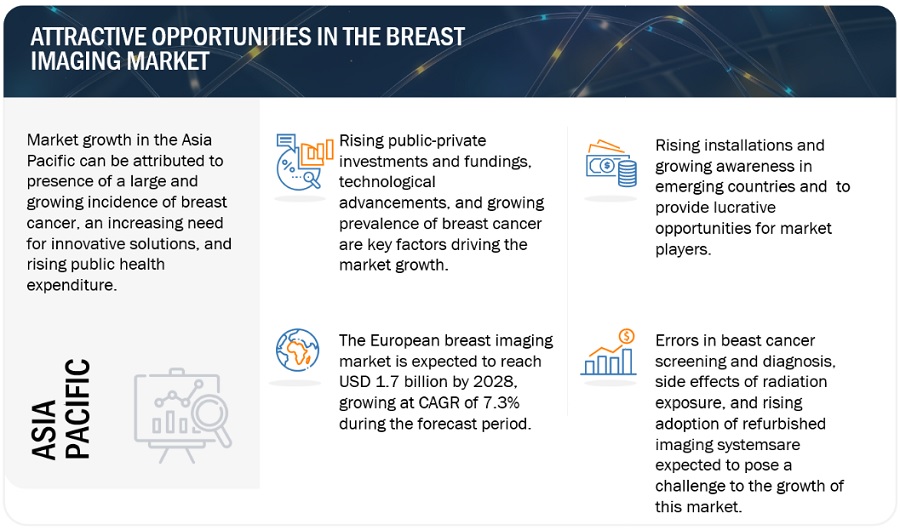Recent Incidence Rates and Trends of Breast Cancer to Boost Breast Imaging Market
Breast Imaging Technologies Market growth is largely driven by factors such as technological advancements, the rising prevalence of breast cancer, the increasing number of screening programs as well as rising number of conferences and symposiums focusing on spreading awareness about the benefits of early screening and diagnosis.
The emerging markets, growing government and private investments to meet the increasing demand for breast cancer screening, and the improving reimbursement scenario are expected to present a wide range of growth opportunities for market players.
Growing incidence of breast cancer
Breast cancer is among the most common cancers affecting women in developed as well as developing countries. According to the American Cancer Society, breast cancer is the second-leading cause of cancer-related deaths in women across the globe. In the US, one in eight women develops invasive breast cancer over the course of her lifetime. According to the American Cancer Society and the National Cancer Institute, in 2018, over 265,000 new cases of invasive breast cancer will be diagnosed among women in the US each year, with 63,960 new cases of non-invasive (in situ) breast cancer (Source: Breastcancer.org). In Canada, as many as 26,300 women were diagnosed with breast cancer in 2017, representing 25% of the new cancer cases in women in that year (Source: Canadian Cancer Society). On an average, 72 Canadian women were diagnosed with breast cancer every day.
Furthermore, more than 70,000 newly diagnosed cases of breast cancer occur in Germany every year (Source: Roche). Japan reports more than 340,000 new cases of female breast cancer every year, with 65,000 new incidences (Source: Ministry of Health, Labor, and Welfare of Japan).
The growing incidence of breast cancer cases leads to an increased burden on governments to raise awareness about the importance of early detection of breast cancer. Thus, with the sharp rise in breast cancer cases, the demand for breast imaging solutions is expected to grow considerably in the coming years.
Download PDF Brochure @ https://www.marketsandmarkets.com/pdfdownloadNew.asp?id=897
High cost of breast imaging systems
Breast imaging systems are priced at a premium and require high investments for installations, which increases the procedural cost for patients as well. This affects the adoption rate of new systems, especially in emerging countries; most healthcare facilities in these countries, consequently, cannot afford such systems. A dedicated breast MRI system costs ~USD 1.1 million, while a breast ultrasound machine on average costs between USD 40,000 to USD 80,000. Additionally, patient support areas and installation costs along with a MRI suite with just machine costs ~USD 3 million to USD 5 million. Similarly, for breast ultrasound systems, there is an additional cost of installation, delivery, printer, and maintenance, which is 15% of the unit price.
Healthcare facilities that purchase such costly systems often depend on third-party payers for reimbursements for costs incurred in screening and diagnostic procedures performed with these systems. Moreover, it takes over two to five years for a system to secure reimbursement once launched in the market. Due to the high cost of these systems and budget constraints, healthcare facilities are reluctant to invest in new or technologically advanced systems.
Inquiry Before Buying Report : https://www.marketsandmarkets.com/Enquiry_Before_BuyingNew.asp?id=897

Comments
Post a Comment